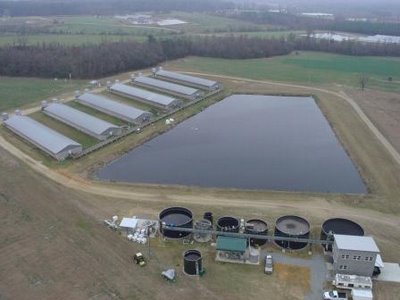1. Buy local food. The average food purchase at a grocery store travels 1500 miles from its source to the grocery. A survey of the stickers on "fresh" produce at my nearby Harris Teeter supermarket in North Carolina turned up yellow bell peppers from Holland and red bell peppers from Israel. When I asked the produce manager if any of the produce was local, he said most of it was from South America. The transport of food from other countries, or across the US, uses fossil fuels and generates greenhouse gases.
2. Buy produce from farmers who don't use pesticides. Pesticides are not only dangerous to our health, they poison animals and ecosystems around the agricultural fields, as well as downwind and downstream of sprayed fields.
3. Buy produce from farmers who don't use chemical fertilizers. Runoff from chemical fertilizers is the biggest single source of nutrient pollution in streams, rivers, and groundwater.
4. Choose foods with minimal packaging. Paper packaging creates demand for wood pulp from pine plantations, which are displacing Southeastern native forests. Leftover dyes from the manufacture of packages find their way into our streams and rivers. And most packaging winds up in our landfills.
5. If you consume dairy products, buy from a farmer who uses sustainable farming practices. If this isn't possible, buy certified organic dairy products. This means the cows' feed was grown without pesticides.
6. If you eat meat and eggs, buy products that came from pastured or grass-fed animals. Animals at pasture don't generate the waste-management problems that animals in confinement do. Pastured waste is assimilated back into the soil naturally. In contrast, waste from factory-farmed animals is liquified and stored in vast "lagoons," then sprayed over cropfields, much of it washing into streams and rivers.
7. If you can't buy pastured meat, buy organic meat. The animals' feed was grown without pesticides, and their waste is not laden with antibiotics and hormones. When animal waste washes into streams and rivers, the feed-additives in their waste also enter the aquatic ecosystem.
8. Eat seasonal produce, even in winter. When you buy produce that a local farmer grows in winter, such as greens, you are helping the farmer stay in business year-round, selling locally grown foods in his own community. You are supporting small-scale local farmers who are much more likely to use sustainable farming methods than are farmers on huge farms with corporate contracts.
9. Eat less meat. The average American eats 246 lbs of meat per year, far more than any other country. In the U.S., 66% of our grain goes to livestock, a very inefficient use of our agricultural lands. Feeding the grain to people directly could feed up to 10 times more people than feeding the meat to people. Or, another way of looking at it - we could stop converting natural lands to agricultural lands if we made more efficient use of the farms we have now. The U.S. population will reach 300 million in October, and will increase another 19% by the year 2025.
10. When you choose foods for environmental reasons, be vocal and visible about it. If you're eating out with friends, tell them why you're not eating a fast food burger (fast food burgers are often made of poor-quality Latin American beef grown where rainforests used to be). Ask your local supermarkets and favorite restaurants to carry local, seasonal, and organic foods. And when they do, thank them. Tell them how tasty it was!
Making just small changes, even a couple of days a week, can have a big impact. It doesn't have to be all or nothing to be effective!

Caption: A typical factory hog farm: the farm's 40,000 hogs are raised in the six long buildings on the left. Each building is longer than a football field. The pool is the waste lagoon for their liquified manure. The round buildings are for feed and feed additives. Photo courtesy of USDA.
Sally Kneidel, co-author of Veggie Revolution.


No comments:
Post a Comment